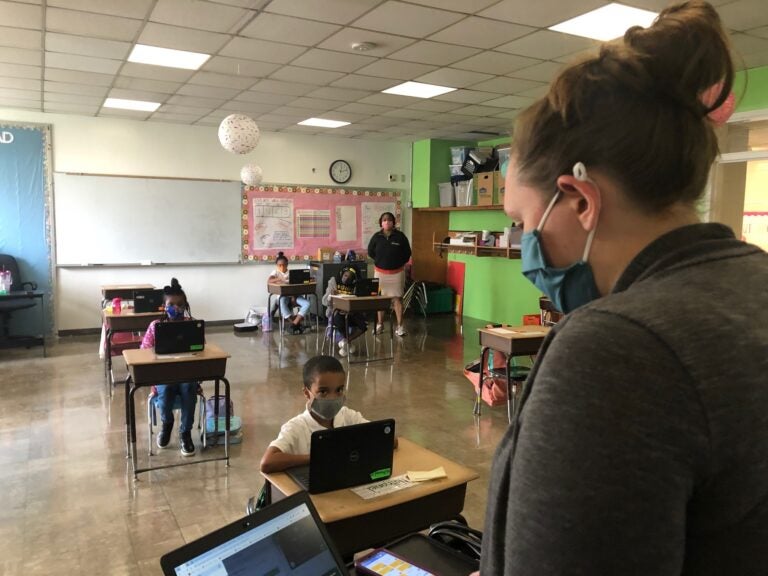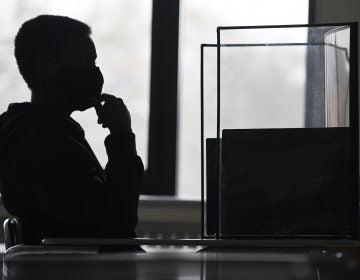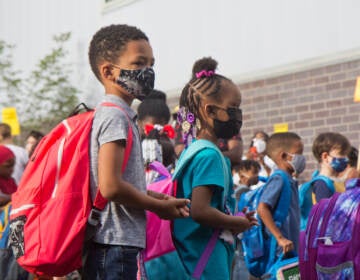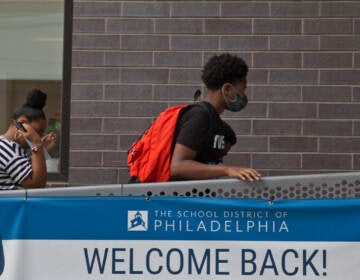Philly schools commit to full return to classrooms, won’t mandate faculty vaccination
District leaders urged communities to be vaccinated before the school year starts as evidence emerges about the delta variant’s greater transmissibility.

(Cris Barrish/WHYY)
The School District of Philadelphia is going full steam ahead on plans to reopen school buildings five days a week in the fall.
In Superintendent William Hite’s weekly press conference on Friday, district leaders detailed their health and safety plans, which fall under Pennsylvania Department of Health guidelines.
For in-person learning, the district is mandating masks for all students, staff, and teachers, no matter their vaccination status.
Staff will be tested weekly for COVID-19, and students will get tested if they exhibit COVID-19 symptoms. Schools will also mandate 3 feet of physical distancing, when possible.
So far, according to district leaders, about 50% of all staff have received the vaccine through their partnership with Children’s Hospital of Philadelphia. Other staff have likely received the vaccine through outside entities, but the district isn’t tracking the total tally.
As cases of the Delta variant rise across Pennsylvania and the nation, more and more businesses and hospitals are requiring the vaccine for employees. CHOP itself announced this week that it would mandate vaccination, in part because it serves many patients under 12 who are ineligible to get shots.
That same rationale has not taken root among school leaders in the region. On Friday, Hite said the district is not planning to make a mandate — yet.
“We know that there are many private institutions that are going that route,” said Hite, “But we have not gone that route yet under advice of counsel. And so when we can mandate it, we will. But at the moment, we have not been advised that that is something we should do.”
Hite and Dr. Susan Coffin, a physician for the Division of Infectious Diseases at CHOP, pleaded with the school community to get vaccinated before the school year starts and as new evidence emerges about the greater transmissibility of the delta variant.
“Those critical mitigation factors that kept us safe last year, as we brought children back into the schools in the spring, will keep us safe against this variant,” said Coffin. “If you or your child is eligible to get a vaccine and haven’t taken that opportunity yet, now is your time. That will provide such a great additional layer and that’s something you have control over.”
Students who want to opt in to virtual learning this coming school year must leave their current schools and enroll in the Philadelphia Virtual Academy, PVA.
“We also know that for some families with extenuating circumstances, a return to in-person learning could pose a significant personal challenge,” said Philadelphia School District Chief of Schools Evelyn Nuñez.
Those circumstances could be medical — as well as financial. Many students this past school year were working jobs while in class. Anecdotally, more families than usual were relying on their children for income due to the impacts of COVID-19.
PVA, which typically starts with sixth grade, is expanding eligibility down to kindergartners for the coming school year.
The two-week enrollment period for the virtual option begins Monday, Aug. 2.
Some families, though, are ready to get in the building.
Alisa Shields, from South Philadelphia, has a 5-year-old daughter, Skylar, heading into first grade at Edwin Stanton School.
Shields often worked from home this year, in the same room as Skylar while she was in virtual school. Through that experience, Shields saw Skylar’s reading and math skills improve, but, she said, “Being at home was hard for her, and I could see her attitude change, and she was just very hard to engage in activities.”
Eventually, after returning to school a few days a week for hybrid learning in the spring, “I think a light went off,” said Shields. Skylar became excited and more enthusiastic about school activities.
“She felt more connected to her school,” said Shields. “We are just so excited about the opportunity to return to school five days a week.”
The district also has big plans for supporting students’ social and emotional needs in the fall.
“When students return in person, we know that all of them, to various degrees, will be dealing with trauma,” said Nuñez.
Nuñez listed some examples of what students will be carrying with them into school: extended isolation; loss of loved ones; the impacts of heightened gun and domestic violence; and the impacts of systemic racial and social injustices that they have witnessed.
“So starting the first day of school, staff in every school will focus on creating safe and welcoming school environments,” said Nuñez, “where students can safely share how they’re feeling, receive the supports that they need to begin to heal, and prepare to smoothly transition back to a more structured, in-person school day.”
Through funding from the American Rescue Plan Act, the district is increasing social and emotional support services with an emphasis on students who have been affected by gun violence, which has continued to rise, sending waves of pain through school communities.
The district will hire more support staff: counselors; behavioral health counselors; and social service supports.
There will also have new programs to help teach students to regulate their emotions and communicate their feelings, and will provide staff, school safety officers, and counselors with trauma-informed professional development.
According to Nuñez, the district also is hiring more special education teachers, psychologists, occupational therapists, speech therapists, and more bilingual assistants and translation services.
Nuñez confirmed as well that the district’s updated bell schedule is final.
The plan was heavily criticized by some parents, faculty, and some city politicians for running counter to advice from doctors and potentially complicating family arrangements. Most high schools will start earlier, at 7:30 a.m, and most elementary schools will start at either 8:15 a.m. or 9 a.m. The district said changes were necessary due to busing logistics.
Nuñez said the district will host forums in the fall for community stakeholders to discuss start times for the 2022-2023 school year.
WHYY is your source for fact-based, in-depth journalism and information. As a nonprofit organization, we rely on financial support from readers like you. Please give today.









